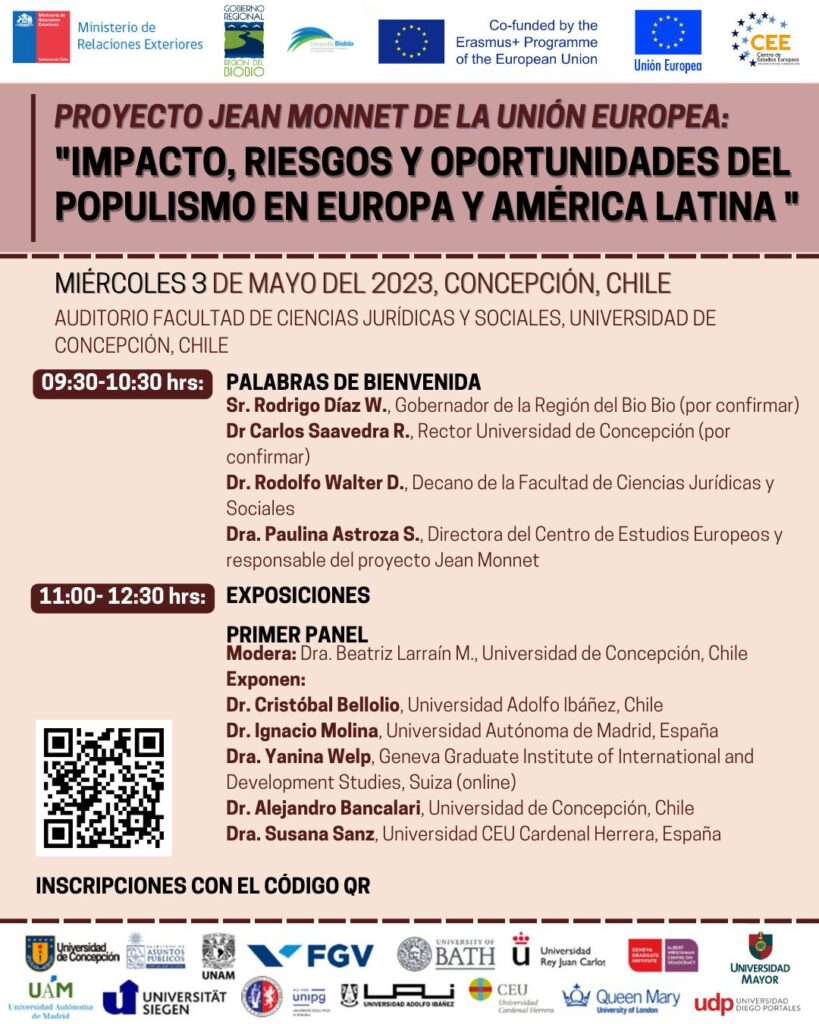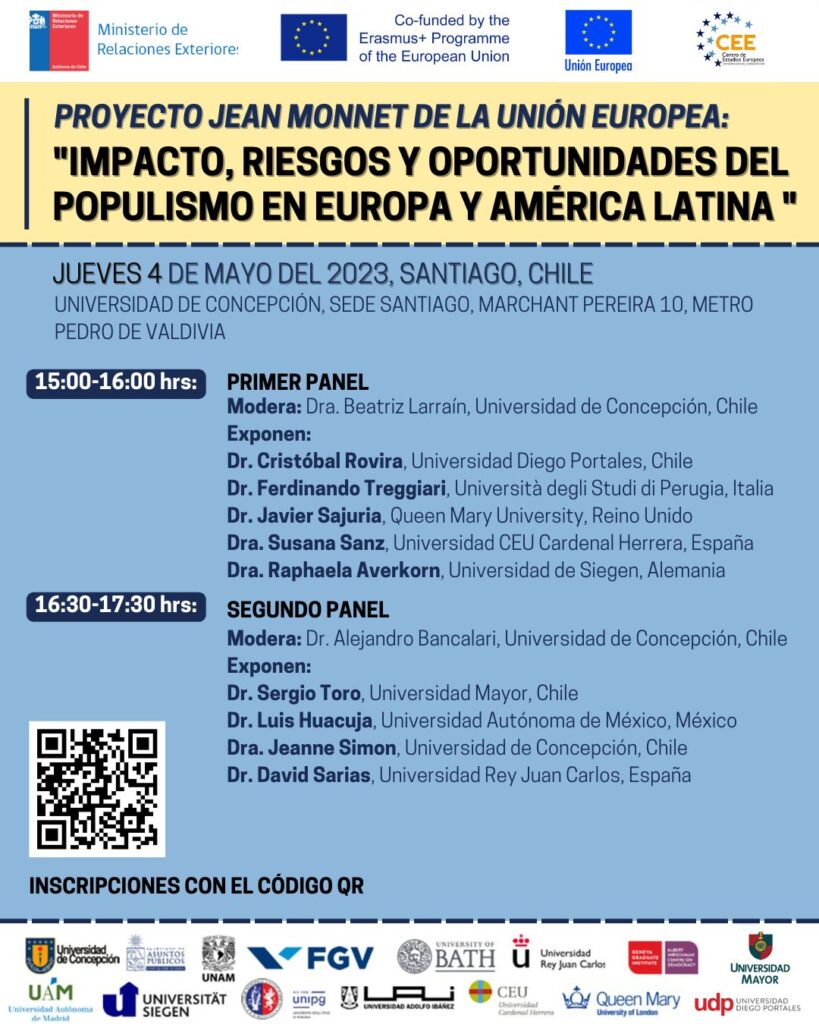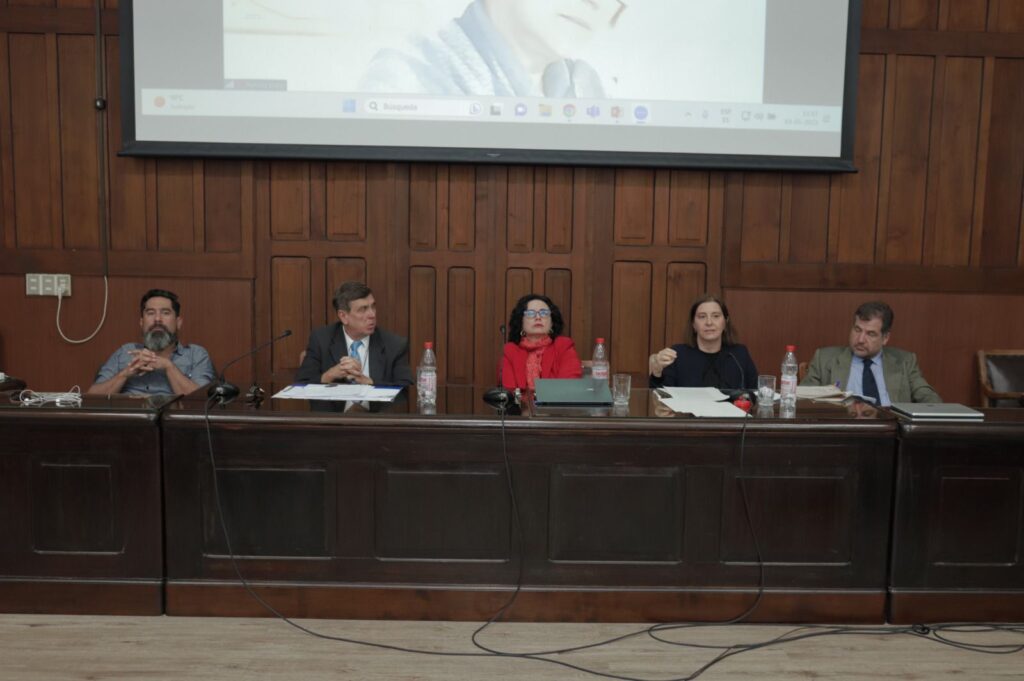Susana Sanz Caballero has been invited to Chile to participate in the conferences organized by the University of Concepción through the Jean Monnet Project of the European Union «Impacts, risks and opportunities of populism in Latin America»
Our colleague Susana Sanz has visited Chile to participate in the conferences organized by the University of Concepción through the Jean Monnet Project of the European Union «Impacts, risks and opportunities of populism in Latin America», whose head is Dr. Paulina Astroza Suárez. Sessions have been held in Concepción and Santiago de Chile.
In her speech, Sanz has given a definition of «populism» and «Rule of Law» as these concepts are understood in Europe and has pointed out the direct link between both concepts (the greater the populism, the greater the decline of the Rule of Law). She has also shown how the structures and mechanisms of the European Union are proving inadequate to counteract this serious crisis of values that populism has produced in Europe and the reasons for this (especially the idea that democracy always consolidates and never suffers setbacks).


The following is a summary of her participation:
In her introduction, Dr. Sanz has pointed out that two decades ago it was unthinkable to speak of populism in Europe, although more than unthinkable it was unnecessary because it did not exist. This is because the old continent had a protective umbrella, a bubble called the EU, which allowed it to enjoy stability, institutional centrality and political homogeneity.
The world in Europe was predictable. We saw the emergence of populism in other parts of the world and felt not alien to it, because it affected us, but immune. However, the first change in this equation was the emergence in 2000 of the Freedom Party of Austria, with its xenophobic discourse.
In this sense, Sanz has reflected on the situation, «something should have indicated to us that the equipment of the EU to face this type of threat was deficient, that the mechanisms available to counteract this situation were precarious, because the EU at that time, that of the Amsterdam Treaty of 1997, did not have instruments to solve the problem posed by this first populist and anti-system party.»
The EU had a mechanism for whoever had breached the common principles, but not for whoever was at risk of doing so. In the absence of its own mechanisms, the EU «outsourced» the settlement of the problem and outsourced the solution by asking the Council of Europe for help. So it was not until the Council certified that there was no risk to democracy and that, despite the declarations of its populist leader, this government was not dangerous for the rule of law, that the EU normalized its relations with Austria.

According to Susana Sanz, it is curious that with such a close antecedent, not enough attention was paid to the arrival of Victor Orbán as head of the Hungarian state in 2010. The seriousness of this threat was slow to be perceived because Hungary had in fact been one of the countries that had most quickly embraced democratic principles and dismantled the communist regime.
The problem in applying Art. 7 TEU to Poland and Hungary – where nationalist populism has reached the government and is dynamiting the institutions of the rule of law – is that, although after 2009 we finally have a mechanism for sanctioning not only the State that breaches the values (now included in Art. 2 TEU) but also those who are at risk of breaching them, unanimity of the members is still required to activate the sanctioning mechanism.
After the introduction, the speaker has defined both concepts, «populism» and «Rule of Law», and then related them to each other.
1. Populism
In the first place, she has criticized the abuse of the use of this term, given that any tendency or person with whom we do not agree is labeled a populist. The features of populism are the following:
- Dichotomous. On one side is the authentic people, whom populists claim to represent, and on the other, the elite.
- Manichean. It proposes simple solutions to very complicated problems, agitating the population as a response to the frustrations of the current social, economic and political organization.
- Anti-system. Institutions are corrupt and must be changed, appealing to emotional arguments.
A populist regime dismantles the national legal system, that is, it reforms and deforms the institutions at will, suppresses the counter powers of the State, amends the constitution and the basic laws, ignores the opposition, harasses the media and persecutes dissenting judges. In addition, it questions the validity of the international legal system because it goes against its sovereignty project.
As explained by Susana Sanz, «the populist appeals to the legitimacy given to him by the majority. The counterpowers of the State would distort the majority decision, which is why the counterpowers would also go against the will of the virtuous people. All their actions would be justified by their supposed moral authority.»
In Central and Eastern Europe there is also a direct relationship between the rise of populism and the collapse of communism because in post-communist Europe, populism arose as a protest against the degradation of the modus vivendi following a regime of a statified economy.
«POPULISM IS ENDEMIC TO MODERN DEMOCRACY AND WILL CONTINUE TO RETURN CYCLICALLY TO EUROPEAN POLITICS»
Moreover, populism would not be a transitory phenomenon limited to certain impoverished social strata, but would respond to a recurrent phenomenon and would always be a real possibility. In this sense, the Council of the Union speaks of democratic fatigue as an added variable to understand the growth of populism in Europe.
The populist narrative, seeking to represent the people, produces the opposite effect, namely an anti-populist by anti-pluralist dynamic. This populism is spreading extremely fast in Europe.
2. Rule of Law Crisis
Our colleague has clarified that in a true democracy there is respect for difference, social and political inclusion, social movements, citizens’ organizations and freedom. So from a liberal perspective, populism increases the risk of arbitrariness in the political system for four reasons:
- Rulers are less questionable and can be held less accountable as the powers of the courts are reduced.
- Human rights and anti-corruption institutions are ignored or silenced.
- Control of the media.
- The process of drafting and approving norms becomes more opaque and makes it difficult for citizens to challenge laws.
Susana has pointed out that «Populism and the erosion of the Rule of Law converge. It is a contagious phenomenon. Challenges to the rule of law are perceived everywhere, they are not isolated episodes. But it is especially painful to see it being challenged in the EU by the model of coexistence that we have given ourselves based on the values of the TEU and which we consider indisputable, such as solidarity, pluralism, freedom, equality, the rule of law and the separation of powers.»
«the rule of law is an essential tool for ensuring respect for human rights. The absence of the rule of law implies arbitrariness»
The Venice Commission warns against the risk of using a purely formal concept of «Rule of Law», requiring only that any public act be authorized by law, assimilating the «Rule of Law» to «Rule by Law». On the other hand, the European Commission has also given a definition of the Rule of Law in its April and July 2019 Communications on the need to strengthen the Rule of Law in Europe.
Threats to the Rule of Law challenge the legal, political and economic basis of the Union. And populism threatens those foundations on which the Union rests.
3. Populism and the Rule of Law Crisis in the European Union
According to Dr. Sanz, although not all of the the Rule of Law Crisis in Europe can be blamed on populism, a large part of the blame does lie with what populism represents. «The populist denounces the Rule of Law and the constitutional state for promoting the dictatorship of minorities, for not seeking the common good. He reinvents the Rule of Law.»
Liberal constitutionalism promotes the separation of powers and universal values, while populisms question the universality of human rights and prioritize a historicist vision of the political community.
Today, the decline of democratic institutions and culture in Europe is so evident that it has led the European Commission to make extensive use of the European Court of Justice, to activate the (not very useful) mechanism of Article 7 TEU against certain States and even to create a procedure to assess the quality of the Rule of Law in the members of the Union.
The signs of deterioration affect many principles:
- Separation of powers
- Principle of legality
- Judicial independence
- Trust in institutions
- Freedom of expression and information
- Freedom of association and assembly
- Freedom of education
- Protection of human dignity and of minorities and vulnerable groups
4. Conclusion
Susana Sanz has concluded that there is a Rule of Law crisis in Europe that is irremediably spreading from one country to another and that the growing populism that is spreading across the continent has much to do with this decline in the rules of the Rule of Law.






